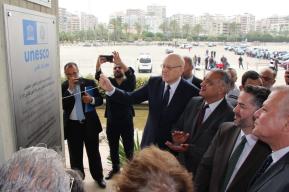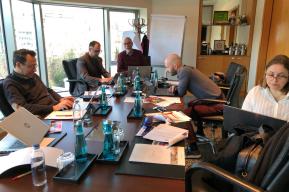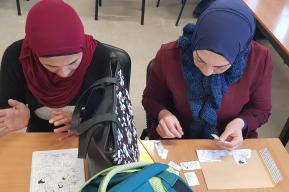The Lebanese media still have a long way to go to change the stereotypical image of women in the content they present, and this is increasingly necessary today to induce societal changes, given the prominent place that the media occupy in the Lebanese landscape. While journalists sometimes lack the experience of delivering content that respects gender equality, they often unwittingly neglect to ensure gender parity in the choice of words, content, or even the persons they choose to shed the light on. In this context, UNESCO Regional Office in Beirut and the National Commission for Lebanese Women organized a training for journalists, as part of the program entitled "The role of media institutions in improving the status of women”, implemented by the Commission and UNESCO.
Over the course of two days, the journalists attended sessions on different aspects of the profession, such as the use of appropriate terminology, professional ethics in media coverage, the influence of the unconscious on the work of journalists, and the well-balanced preparation of media reports. "The aim of this training is to equip journalists with skills relating to covering sensitive topics around women or on gender," explains Milad Hadchiti, trainer in communication and constructive journalism. “We are also trying to improve the balance in media representation between men and women. Today there is a problem with form, style and content. We have an issue of education and society, which is obviously reflected in the media”, regrets the coach, who assures that gender issues must be a priority. He adds: “Change takes time. It’s an accumulation of progress. This is why these kinds of sessions are important and should be continued. It also allows us, coaches, to know the challenges and obstacles that journalists face on a daily basis, especially that the subject seems new to many participants”.

These claims are echoed by Mira Abdallah, Director of Communications at the World Association of Newspapers and expert on gender-related media issues, and who emphasizes the importance of seeking the views of affected journalists. “The interaction is amazing, she says. Week to week we are already seeing a change". "Nowadays, we are at the edge of the red zone. There is obviously awareness and more awakening, but we are still fighting stereotypes. Sometimes a single TV star can ruin all the progress we've made if a big mistake is committed during prime time. The impact on the ground thus begins with journalists and must continue on several levels. What we really need is a database of experts and activists ready to help journalists for free when they need it. But I am optimistic. Lebanese media are talking more about topics related to women, LGBT community, gender, and the new generation is promising because it is more aware of rights."
A comprehensive approach
The sessions also focused on the differences between the representation of men and women in advertisements, the conceptions that must be modernized in journalistic work, and the terminologies to be avoided so as not to perpetuate stereotypes and prejudices. They took place in the presence of Georges Awad, Director of the Communication and information program at UNESCO Beirut and Claudine Aoun, President of the National Commission for Lebanese Women. The sessions are part of the National Implementation Plan for Security Council Resolution 1325 on Women, Peace and Security, which the Lebanese government approved in 2019 and which the Lebanese State has committed to apply.

"This training is useful because it clarifies certain terminology that we did not know about the negative effects it can have on the condition of women, and how to use inclusive language, says Ahmad Rabih, a journalist. This may create awareness among our viewers as well, because we can’t hide that the problem exists. With this training, I realize that we need a code of conduct to have unified criteria on journalistic work and the status of women". For her part, journalist Mirella Bou Khalil praises the practicality of the training, and the choice of experts. “The biggest problem is women who don't know their rights, she says. We need to pass this knowledge on to our colleagues, and to conduct awareness campaigns that start with schools, universities, institutions. On a personal level, I have worked to induce some change in the television where I work, by focusing on subjects relating to Lebanese women. But the most important thing is to train the heads of departments within the media, because they hold the power and can create change”.
To alleviate this problem and within the framework of the same project, UNESCO and the National Commission for Lebanese Women also held a round table with the heads of departments within the Lebanese media to discuss the subject. Human resources managers were also invited to attend, for a more comprehensive approach to the problem and to promote the employment of women in media institutions, especially in key positions that they often struggle to obtain.









